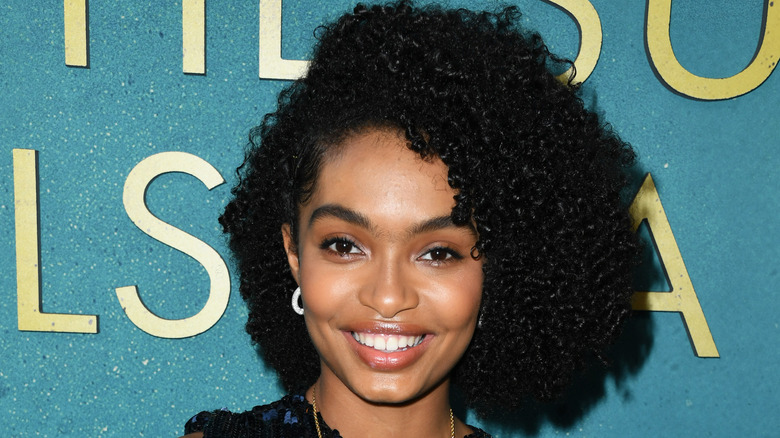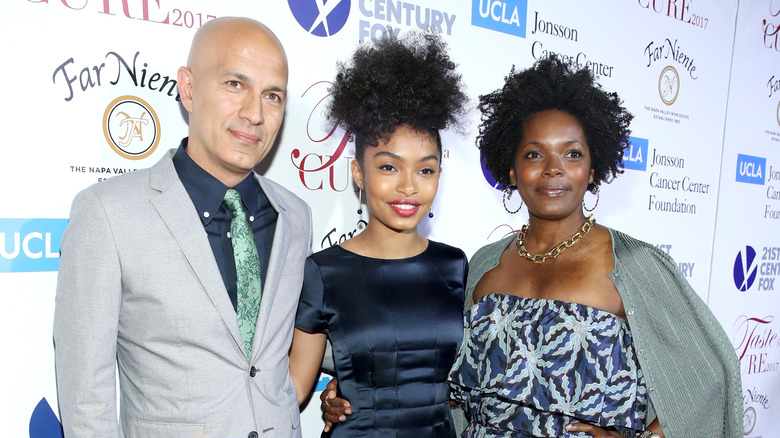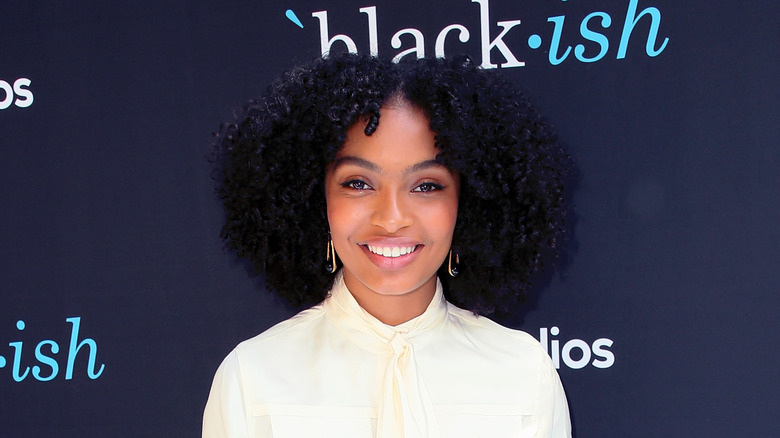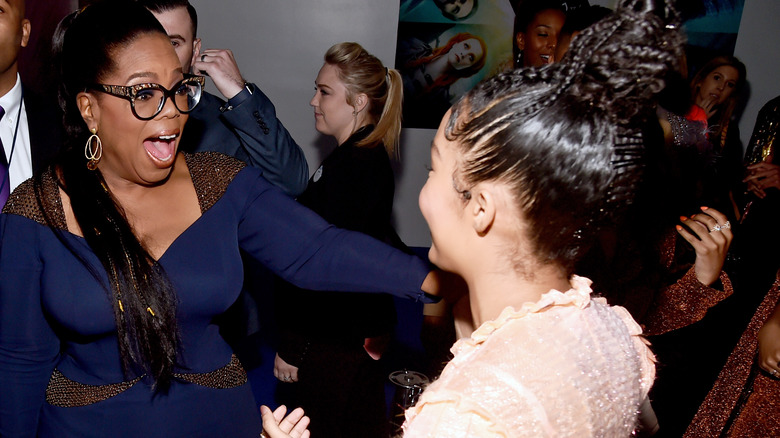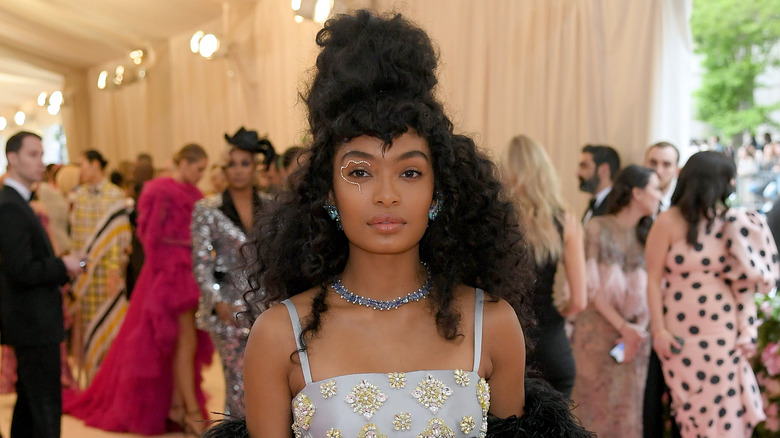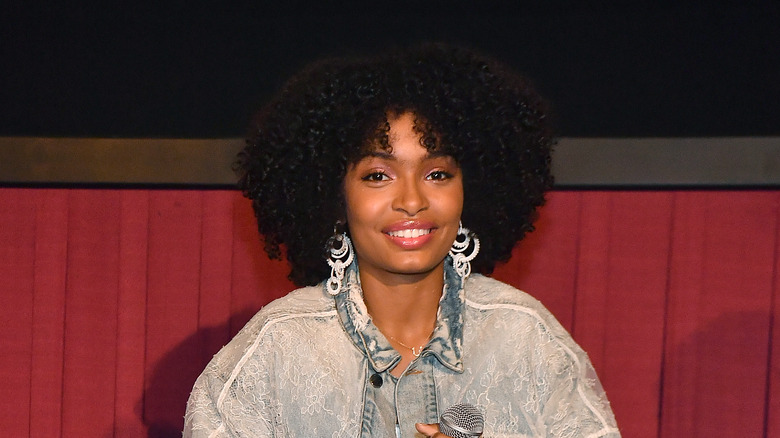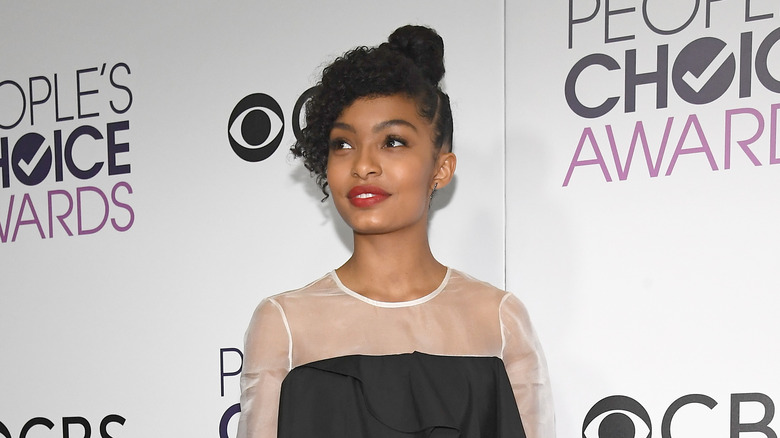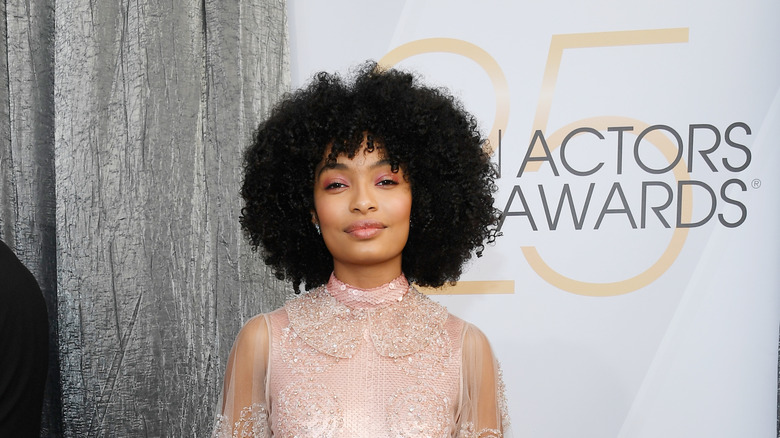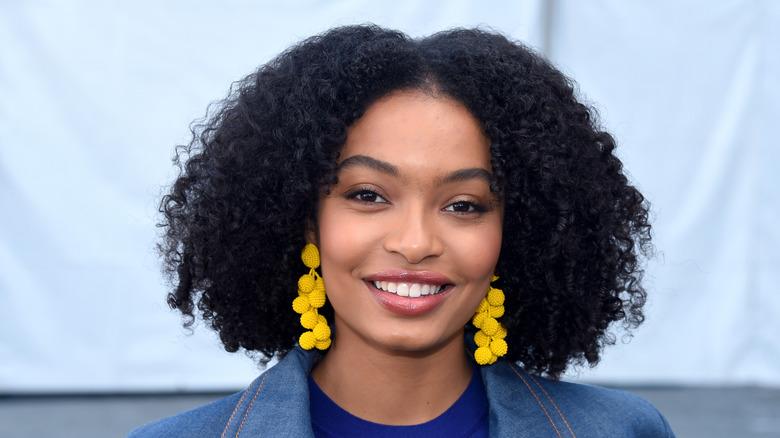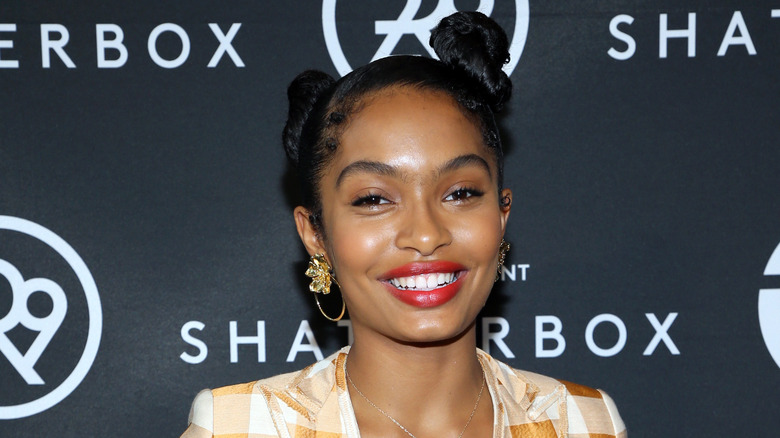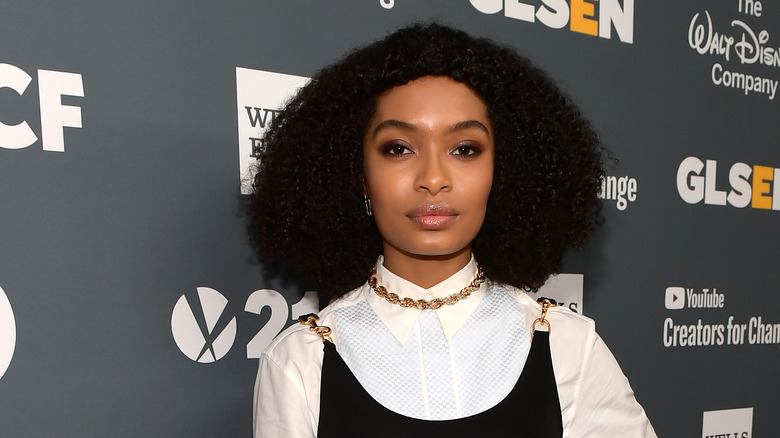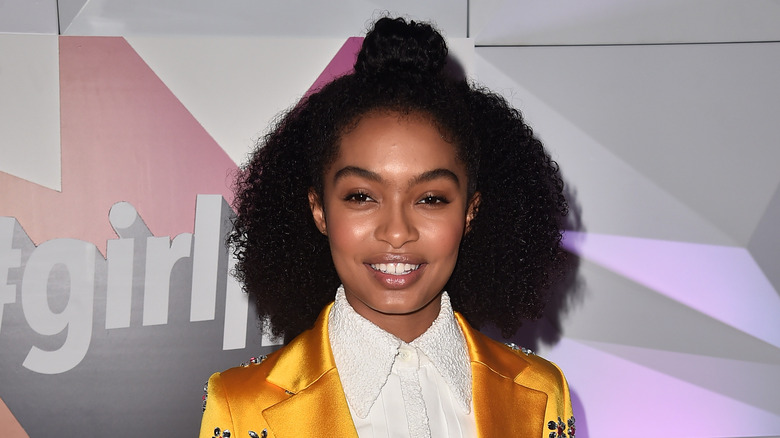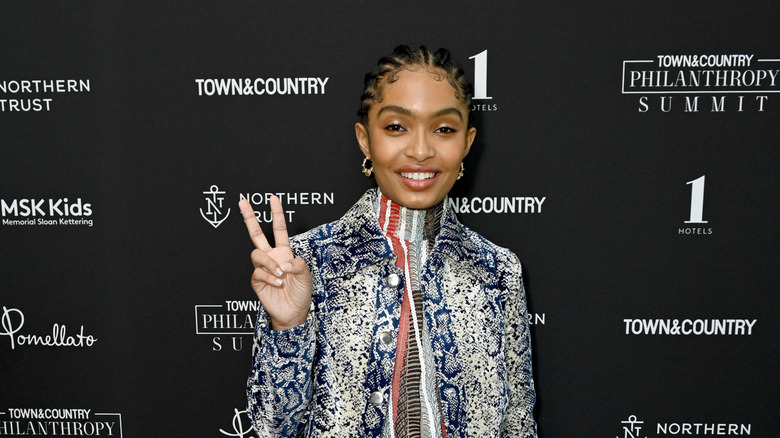The Untold Truth Of Yara Shahidi
From actress to activist, Yara Shahidi has packed quite a lot into her short life. Born at the turn of the millennium on February 10, 2000, Shahidi is a celebrity for a new generation: Generation Z. While many like to blame the world's woes on millennials, who are held responsible for destroying everything from cable TV to tuna, the generation after them, Gen Z, is supposed to be the generation that saves us all.
Whether or not Gen Z will save the world remains to be seen, but if Shahidi is representative of her generation, there may be some hope. The young star, best known for her roles on TV sitcom Black-ish and its spin-off Grown-ish, is budding into a movie star, but she's not stopping there. She's also a noted activist with a commitment to social justice who is swiftly becoming known as the voice of Gen Z. She's barely into her adult years, yet when Shahidi speaks she could easily be taken for someone twice her age. If you aren't familiar with her yet, rest assured that you will soon; this young woman is taking the world by storm.
A precocious child
Shahidi seems wiser than her years. This is a quality that has been present since her childhood, when she skipped first grade. Her teachers wanted to send her straight into third grade, but her mother felt skipping two grades would be too intense. "She's highly intellectually motivated," Shahidi's mom told Town & Country.
While she started acting at the age of 9 opposite Eddie Murphy in Imagine That, Shahidi's acting career was not deliberately planned. "I wasn't one of those kids who woke up and said, I want to be an actor," she told Refinery29. "I've always wanted to be a historian. For my tenth birthday party, I dressed up as a historian in a seersucker suit."
Although she didn't plan on a career in show business, it's clear where she gets her talent from. Her father is a cinematographer, and her mother is also an actress. This made for what Shahidi calls "a very atypical childhood."
Her multicultural family cultivated her activist spirit
Shahidi's father is Iranian while her mother is African American. Her multicultural family raised Shahidi to appreciate diversity. Her paternal grandfather nurtured a love for history in Shahidi, while her maternal grandfather, who was once associated with the Black Panthers, nurtured her activism.
"Because of my family's background, I understand how interconnected cultures are," Shahidi told Town & Country. "Traditions may be different, but in terms of shared values, they're transcontinental. My love of history, or even being socially engaged, stems from having, firsthand, people to care about around the globe and at a young age expanding my community beyond these fake borders we put on each other."
As a woman of color, Shahidi is very much conscious of her race and the marginalization that comes with being a minority. "On one side of my family is the list of people who can't enter the US from certain countries and on the other side are those who are familiar with what it's like being black in America," she told Net-a-Porter.
"It's an oxymoronic time; so much is happening socially and politically"
Shahidi is very much aware that being born at the turn of the millennium also means she was born in a turbulent era. "It's an oxymoronic time; so much is happening socially and politically, in a way that is terrifying but at the same time is producing this incredible level of unity," she told Vogue. "People's lives, their livelihoods are at stake."
What do you do when you're a young person faced with so much unrest? For Shahidi, the answer is clear: change things. "Part of being an engaged citizen is looking around you and asking, 'Why is this happening, how is this happening?'" she said. "'Why were the cops called on a young girl napping in her common room? Why were they called on a woman at Waffle House?' You have to find the common denominator — and, for me, I realized I shared that common denominator and couldn't help but be involved."
Growing up on "Black-ish"
When Black-ish first aired, Shahidi was just 14 years old. While her childhood was far from a typical one, growing up on the set of the television show provided her with a nurturing and supportive upbringing — one that Shahidi is still grateful for.
"It's a funny place to grow up because they appreciate you being a kid, and then there are moments in which they want to know your opinion like a peer," she told Net-a-Porter. "I've always been asked how I felt, whether it be at the dinner table or at my place of work, but overarchingly, what Black-ish has shown is the power of aligning with projects you truly believe in. It's set a precedence. It is a privilege to be able to say pretty much from the get-go that this is what I enjoy and for my opportunities to be so aligned."
She has some big name supporters
When you're a celebrity, rubbing shoulders with the rich and famous is par for the course — but Shahidi has gotten some endorsements that would wow any celeb. Former first lady Michelle Obama was so impressed with her that she wrote her a letter of recommendation to Harvard; Shahidi was accepted. Oprah is also a fan of the young activist, and thinks that she could become president one day.
Shahidi hasn't ruled out a political career, but she isn't sure that she wants to end up in the White House. "I definitely want to be in like, a politics-adjacent kind of position," she told ET. "I do want to be in a place in which I can implement that level of change — president, I don't quite know. I always think about how strange it'll be that they'll be going back through my Instagram that I had when I was 12. So that's a little eerie, but I definitely want to be [in Washington] D.C., yeah," Shahidi added.
Whether or not she does make a run for president one day, one thing that's certain is that she'll have a lot of people supporting her no matter what she does.
She views her life as "a nice little happy accident"
If you're thinking that Shahidi's life seems charmed, you're not alone. Even she can't believe the breaks she's gotten. One of the things she's proudest of is getting into Harvard, and not just because it's a prestigious Ivy League school. She's proud of herself because it's something she had to actively work to earn and saw her efforts rewarded. "Personally, getting into college was a big deal because I realized it's probably one of the only things I've fully planned," she told Vogue. " The rest of my life has been, for the most part, a nice little happy accident. I'm glad that it happened this way, but it's nonetheless unintentional."
She's always prioritized her education, even while focusing on acting. "School has been the one thing that I've consistently had my eyes on for the past 12 years," she said. "There's that initial fear when you close your eyes and have to click the 'look at decision' button [on each college application] to see what they've said about you. It can feel like such a judgment on your entire life."
"There's power in just displaying joy"
Shahidi is active on social media, but she doesn't just use it to socialize (although that's part of it). Her social media presence is a powerful tool for activism as it is for many of her generation. "Social media matters," Shahidi told Refinery29. "Twitter matters, Instagram matters. Sometimes in fantastic ways, and sometimes in not-so-great ways. When you look at my peers on social media, a lot of them are doing other things outside of it."
With 3.6 million followers on Instagram and more than 350 thousand on Twitter, Shahidi certainly is keeping her social media fans engaged. But not everything she posts is serious, and this is a critical part of her brand. She's just as likely to post a James Baldwin quote as she is to share a video of her dancing. "There's power in just displaying joy," she told Town & Country.
Turning 18 was a big deal for her for this reason
Turning 18 is a big deal. At that age, you're finally a legal adult and free to make your own decisions. For Shahidi, turning 18 was especially exciting because it meant she was able to vote for the first time. She celebrated the milestone with a birthday party that doubled as a voter registration drive. "It's kinda scary," she told Net-a-Porter of becoming an adult. "17 was more than good to me; it's the perfect age because you get the full perks of being a teenager without being an adult. But the one thing that I am looking forward to is feeling more empowered to contribute. My friends have always said that if I got a fake ID, it would be to vote early.
A month before her birthday she launched Eighteen x 18, a voting initiative aimed at getting young people to vote that also educates them on hot button issues. "It is about getting rid of that barrier to entry and the intimidation that people go through about not being smart enough — or whatever it may be — to be involved in politics," she told Bustle.
The media she consumes reflects her convictions
What does an actress and activist who is acknowledged as one of the most influential figures of her generation do in her down time? Even Shahidi's hobbies reveal her convictions. She's a big fan of author James Baldwin, a 20th century African American writer noted for exploring race and identity in his work. Her favorite book, Giovanni's Room, is by Baldwin and is considered a staple of LGBTQ+ literature.
"Baldwin is at the intersection of so many different identities, and represents the proletariat in such a beautiful way," Shahidi told Vogue. "I recently re-read it while listening to Blonde by Frank Ocean. I couldn't stop crying."
Frank Ocean is another one of Shahidi's favorites and, like Baldwin, is an LGBTQ+ icon. He's also politically minded and, like Shahidi, encouraged people to vote during the 2018 midterm election. It's apparent that, in her favorite artists, Shahidi has chosen people merge creativity with social awareness and is following their example.
"It's amazing to have this platform to help make a difference"
Many college students aren't sure of what they want to do as a career. Very few have already established their careers, let alone have become as successful as Shahidi has. Yet acting, and even activism, aren't enough for her. She's determined to give back to the community. Her voting initiative Eighteen x 18 seeks to empower youth through civic engagement, while another of Shahidi's projects, Yara's Club, is a mentorship program that brings together high school students to discuss social issues.
Shahidi's fame is a means to a more altruistic end. "It's amazing to have this platform to help make a difference," she told Vanity Fair. Instead of viewing her youth as something holding her back from creating social change, Shahidi sees it as an asset.
"Being a part of a generation in which societal contribution and action are expected, I've had the great fortune of inter-generational support and access to the entrepreneurial tools and information needed to exponentially grow my own philanthropic platform, impacting my global community for the better," she told Forbes.
"Usually I am just a kid in a hoodie, jeans, and a fanny pack"
Shahidi is one of those women who seems to be blessed with an impeccable sense of style. She's not really hung up on her appearance, though, and is more focused on feeling comfortable instead of dressing up for the cameras. "Usually I am just a kid in a hoodie, jeans, and a fanny pack," she told Net-a-Porter.
Still, dressing casually doesn't mean that she's not trying to make a statement through her personal style. Shahidi is very aware that fashion often carries a deeper sociopolitical message and goes beyond just looking good. "[Fashion] is so important," she said. "It's why I wear a ton of political T-shirts because I get to wear things that state my political opinions. Fashion is associated with an ideology. You could wear a beret, but when you tilt it to the side, you go from Parisian to Black Panther."
Fighting against colorism
Shahidi is also very aware that the opportunities that have been afforded to her might not have come so easily if she didn't fit a particular standard of beauty. As an African American woman with lighter skin, she recognizes that she experiences a certain amount of privilege. Far from taking that privilege for granted, Shahidi is vocal about the particular challenges facing black women in Hollywood, and the unfair preference given to those with lighter skin — a form of discrimination known as colorism.
"So many times in the conversation, [colorism is used] as a straight up denial of blackness," she told Refinery29. "We use it as a denial of any sort of experience versus using it as an affirmation that there are things that I haven't had to go through, and the reason that I'm probably not aware of them is that I haven't had to go through them."
Shahidi added, "Having a mother with the exact same face, but with different skin tones, has always made it a conversation in our family."
You won't find her partying
You've probably gathered by now that Shahidi isn't your typical celebrity. While she grew up in the public eye and has certainly banked enough money by now to retire early if she wants, she's focused on making the most of her opportunities. While some people her age, celebs or not, are off partying, Shahidi is staying focused on the future. What might seem like a tendency to be a homebody isn't just a personal preference, though, but also a decision Shahidi makes because she she is conscious that Hollywood is often harder on women of color.
"I definitely do believe there's a culture which makes it harder to mess up or get back up once you've messed up," Shahidi told Refinery 29 when asked if she felt she couldn't get away with as much as her white peers. "I am hyper aware of my surroundings at all times. I'd be lying if I didn't say I was hyper aware of what other people around me were doing. I'm never going to find myself in positions in which I genuinely regret what I'm doing."
Hollywood isn't very important to her
What's next for Shahidi? Finishing Harvard is definitely in her plans, but, like many people her age, the rest of her future is uncertain. Whatever it holds, she's determined to make her mark. "I have this whole thing about legacy," she told Net-a-Porter. "A legacy only lasts 50 years, and when that generation ends, then what was my impact?"
When asked what her plans for her acting career are, Shahidi was ambivalent. "I guess I start by saying, Hollywood is seemingly extremely trivial," she said. "Media is important, but the machine around the media is centered around red carpets and this idea of celebrity and personal cachet. All of these things in the long run don't have much of an impact."
It's a bold statement for a young actress whose career is on the rise, but its also proof that Shahidi isn't really in it for the fame. It seems likely that, going forward, her acting career may take a backseat to her activism.
